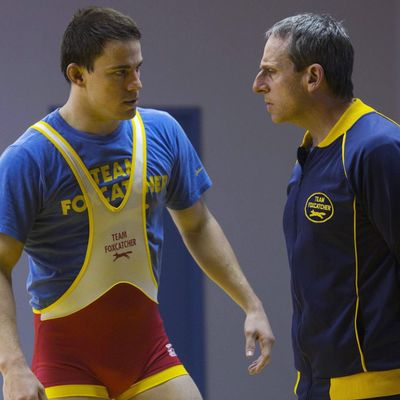
It’s hard to believe that’s Steve Carell as the real-life weirdo John du Pont (of the du Ponts) in his first scene in Foxcatcher. It’s an amazing transformation. Carell’s long, fake beak isn’t his, but he makes it his own. He tilts his head back 45 degrees and stares down it like a rifle sight. Otherwise, he’s so abstracted that he’s eerie. Sitting in his vast estate — Foxcatcher — near Philadelphia, he speaks in rhythmless inflections and with mysterious pauses that people sit through because … he’s John du Pont. He also fancies himself a wrestling coach and wants to fund and house a team that goes all the way to the Olympics. Money isn’t enough for him. Like many regular Americans, his identity hinges on winning. So he summons Mark Schultz (Channing Tatum), a former Olympian at low ebb, and offers to change the man’s life. Let’s win together, he says. As if he’ll do anything together with anyone.
Director Bennett Miller keeps the energy low and the pauses cavernous so that the early du Pont scenes play like deadpan comedy — even if you know what’s coming. That’s the part that works. Miller and screenwriters E. Max Frye and Dan Futterman undersell the ruling thesis, but it’s there: Whatever we tell ourselves about class mobility in America, the wealthy behave with the capricious destructiveness of old monarchs. They casually destroy families. They sully true American values. Du Pont is an absent, ineffectual wrestling coach, but in this rigged economy, he’s in a position to buy himself an Olympic medal. Then again, there’s a level on which — as bats as he is — he knows he’s outclassed. He has to come gunning for real Americans.
Foxcatcher has wowed a lot of critics and festival audiences. The O word comes up regularly vis-à-vis Carell. The acclaim is easy to understand. The movie’s take at times is fascinating. But it’s basically one long, sick joke played at half speed. It’s a ponderous, sick joke. After that first meeting between Schultz and du Pont, Miller directs the next two crawly hours in exactly the same key. It’s never clear why Schultz, from the opening frame, is sunk in gloom, another of God’s Loneliest Men. And Carell runs out of variations. After an hour, all that’s left is to watch him stare down his nose while his eyes get crazier and everyone around him pretends not to notice.
In real life, people around du Pont did notice and considered institutionalizing him. You wouldn’t know from Foxcatcher that he was diagnosed a paranoid schizophrenic with active delusions and that he didn’t live in a total vacuum. The film’s implication is that his lunacy is an outgrowth of his .01 percenter insularity and dirty-chemical legacy — and perhaps (though it’s left hanging) a homosexuality he was forced to repress. Which is a fine, progressive thesis. My problem is not with the filmmakers’ politics, but with their one-track minds when it comes to drama. Miller isn’t interested in testing his own theses. His and Futterman’s Capote had a similar monotony. It was framed as a story of damnation — of selling one’s soul for success — with no regard for the transcendent power of Capote’s art. Though Philip Seymour Hoffman turned it into a tour de force of self-loathing, it was deadly in all the ways that mattered. Cinematically, Foxcatcher is more resourceful — visually, it breathes. But it’s still a true crime story bloated into looking significant.
The only engaging character is the most “normal,” Mark Schultz’s Olympic-wrestler brother, Dave, played by Mark Ruffalo. An early scene in which Dave tries to train his morose brother and gets bloodied for his trouble is haunting — the grappling is a metaphor for the love and hate between brothers. When du Pont brings Dave in as a so-called assistant coach — though of course Dave does all the coaching — Ruffalo suggests that Dave is puzzled by his employer but happy for the opportunity. In the film’s best scene, du Pont sends a film crew to interview Dave on the subject of du Pont’s genius as a coach. They want him to say he considers du Pont a mentor. I woke up from the stupor the movie had induced when Ruffalo registered subtle disbelief and then struggled to get those words out — stopping on the brink, going back, weighing the option of lying versus saying, “Enough!” It’s the only time in Foxcatcher you don’t know what a person will do next.


